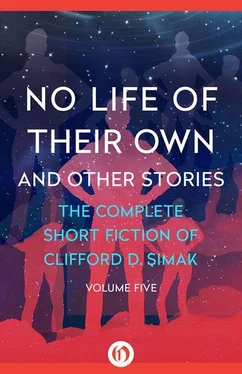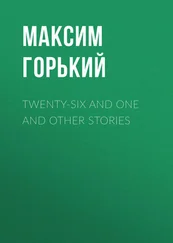“They’re the straw bosses of the outfit,” declared Hugh. “Carrying out the orders of the Martians. The Martians’ hands and eyes, you might say.”
He dug at the sand with the toe of his space boot.
“Another swarm of them took off just before we started out on this trip,” he said. “While you were in the ship. I watched them until they disappeared. Straight up and out until you couldn’t see them. Just like they were taking off for space.”
He kicked savagely at the sand.
“I sure as hell would like to know where they go,” he said.
“There’ve been quite a few of them leaving lately,” said Scott. “As if the building were a hive and they were new swarms of bees. Maybe they’re going out to start new living centers. Maybe they’re going to build more buildings …”
He stopped and stared straight ahead of him, his eyes unseeing. Going out to start new living centers! Going out to build new buildings! Shining metallic buildings!
Like a cold wind from the past it came to him, a picture of that last night on Earth. He head the whining wind on Mt. Kenya once again, the blaring of the radio from the machine shop door, the voice of the newscaster.
“Austin Gordon … Congo Valley … strange metallic city … inhabited by strange metallic insects!”
The memory shook him from head to foot, left him cold and shivery with his knowledge.
“Hugh!” he croaked. “Hugh, I know what it’s all about!”
His brother stared at him: “Take it easy, kid. Don’t let it get you. Stick with me, kid. We’re going to make it all right.”
“But, Hugh,” Scott yelled, “there’s nothing wrong with me. Don’t you see, I know the answer to all this Martian business now. The lilies are the Martians! Those bugs are migrating to Earth. They’re machines. Don’t you see … they could cross space and the lilies would be there to direct them.”
He jumped to his feet.
“They’re already building cities in the Congo!” he yelled. “Lord knows how many other places. They’re taking over the Earth! The Martians are invading the Earth, but Earth doesn’t know it!”
“Hold on,” Hugh yelled back at him. “How could flowers build cities?”
“They can’t,” said Scott breathlessly. “But the bugs can. Back on Earth they are wondering why the Martians don’t use their rockets to come to Earth. And that’s exactly what the Martians are doing. Those rockets full of seeds aren’t tokens at all. They’re colonization parties!”
“Wait a minute. Slow down,” Hugh pleaded. “Tell me this. If the lilies are the Martians and they sent seeds to Earth twelve years ago, why hadn’t they sent them before?”
“Because before that it would have been useless,” Scott told him. “They had to have someone to open the rockets and plant the seeds for them. We did that. They tricked us into it.
“They may have sent rockets of seeds before but if they did, nothing came of it. For the seeds would have been useless if they weren’t taken from the rocket. The rocket probably would have weathered away in time, releasing the seeds but by that time the seeds would have lost their germinating power.”
Hugh shook his head.
“It seems impossible,” he declared. “Impossible that plants could have real intelligence … that flowers could hold the mastery of a planet. I’m ready to accept almost any theory but that one …”
“Your mind sticks on parallel evolution,” Scott argued. “There’s no premise for it. On Earth animals took the spotlight, pushing the plants into a subordinate position. Animals got the head start, jumped the gun on the plants. But there’s absolutely no reason why plants should not develop along precisely the same lines here that animals developed on Earth.”
“But the Martian lily lives only one season … ten months … and then it dies,” Hugh protested. “The next season’s growth comes from seed. How could plants build intelligence? Each new crop would have to start all over again.”
“Not necessarily,” declared Scott. “Animals are born with instinct, which is nothing more or less than inherited intelligence. In mankind there are strange evidences of racial memory. Why couldn’t the plants do the same thing with their seed … progress even a step further? Why couldn’t the seed carry, along with its other attributes, all the intelligence and knowledge of the preceding generation? That way the new plant wouldn’t have to start from scratch, but would start with all the accumulated knowledge of its immediate ancestor … and would add to that knowledge and pass the sum total on to the generation that was to follow.”
Hugh kicked absent-mindedly at the sand.
“There would be advantages in that sort of development,” he agreed. “It might even be the logical course of survival on a planet like Mars. Some old Martian race, for all we know, might deliberately have shaped their development toward a plant existence when they realized the conditions toward which the planet was headed.”
“A plant society would be a strange one,” said Scott. “A sort of totalitarian society. Not the kind of a society animals would build … for an animal is an individual and a plant is not. In a plant race individuality would count for nothing, the race would count for everything. The driving force would be the preservation and advancement of the race as a whole. That would make a difference.”
Hugh glanced up sharply.
“You’re damned right that would make a difference,” he said. “They would be a deadly race. Once they got started, noting could stop that singleness of purpose.”
His face seemed to blanch under the tan.
“Do you realize what’s happening?” he shouted. “For millions of years these plants have fought for bare existence on Mars. Every ounce of their effort has been toward race preservation. Every fall the bugs carefully gather all the seeds and carry them inside the building, bring them out and plant them in the spring. It if hadn’t been for some arrangement like that they probably would have died out years ago. Only a few scattered patches of them left now …”
“But on Earth … ,” said Scott.
And the two of them, white-faced, stared at one another. On Earth the Martian lilies would not have to carry on a desperate fight for their very existence. On Earth they had plenty of water, plenty of sunlight, plenty of good, rich soil. On Earth they grew larger and stronger and straighter. Under such conditions what would be the limit of their alien powers?
With the lilies multiplying each year, growing in every fence row, every garden, crowding out the farmers’ crops, lining every stream, clogging every forest … with swarm after swarm of the metallic bugs driving out into space, heading for the Earth … what would happen?
How long would the lilies wait? How would they attack? Would they simply crowd out every other living thing, conquering by a sort of population pressure? Or would they develop more fully those powers of forcing animal minds to do their bidding? Or did they have, perhaps, even stronger weapons?
“Hugh,” Scott rasped, “we have to warn Earth. Somehow we have to let them know.”
“Yes,” Hugh agreed, “but how?”
Together, limned against the harsh horizon, they stood, looking across the desert toward the Martian building.
Tiny figures, dimmed by distance, scurried about the building.
Scott squinted his eyes against the desert glare.
“What are those?” he asked.
Hugh seemed to jerk out of a trance.
“The machines again,” he said wearily. “They’re getting ready to shoot another rocket out to Earth. It’ll be the last one of the season. Earth is drawing away again.”
“More seeds,” said Scott.
Читать дальше












